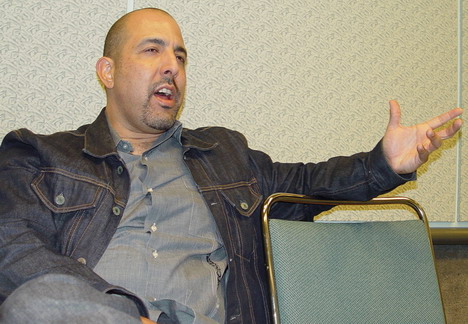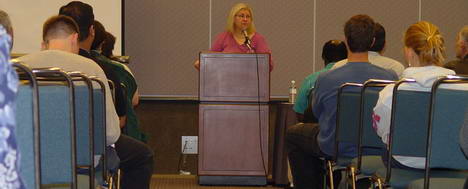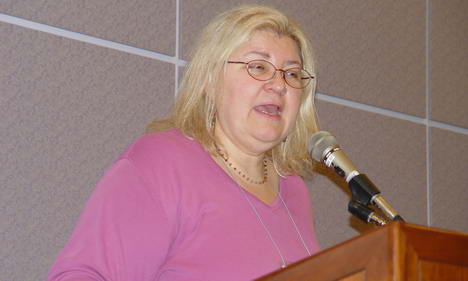|
|
 |
|
| |
Screenwriting
|
| |
 |
Life’s A Pitch
A day in the trenches at Screenwriters Expo 3
 |
| J. Freedman & Marc Hernandez -- photo by J. Asmar |
Click here to enlarge picture
Marc Hernandez is managing partner of Crescendo Entertainment Group, a literary management and production company in Los Angeles. Although only three years old, Crescendo already represents 20 screenwriters and recently launched a production division which is seeking literary properties, video games, books, etc. to set up at studios with Crescendo attached as producer.
I caught Hernandez in between pitches and asked him why he was hanging out at a pitch fest for aspiring screenwriters.
“I think it’s a great forum for finding clients and material and networking with a lot of executives who are in the business where it would take considerably more time to schedule a meeting or a drink,” Hernandez told Filmmakers. “Just look at how many tables are here, maybe 40 or something and I get to hang with these people all weekend.”
I pointed out to Hernandez that there were thousands of people at the Expo and around 30,000 to 50,000 scripts registered with the WGA every year. I asked him how he manages to find the needle in the haystack, the bright, shining, potential hit screenplay amongst all the others in one Screenwriters Expo weekend.
“And it’s such a needle!” Hernandez agreed. “Let me tell ya,’ for every 100 pitches you hear, the things you may actually respond to and think are commercially viable where the writer is talented, viable and good in a room, out of that 100 there may be five or less.”
Asked what the biggest mistake he is discovering when he hears pitches all day at the pitch fest, Hernandez said “The biggest mistake is not understanding who you are pitching to. If I’m a writer and I go up to Jerry Bruckheimer’s production executive and I try to pitch them a romantic comedy, I haven’t done my homework. I’m seeing that a lot here. People are coming in and they don’t know, not only what genres we are looking for or the other executives are looking for, but what genres are really needed and being sought out by the studios at this time.”
My obvious next question: Which genres are the studios looking for at this time?
 |
| Marc Hernandez -- photo by J. Asmar, FilmMakers.com |
Click here to enlarge picture
“Horror is very big right now because it can be made at a price and translates very well overseas,” Hernandez observed. “If you make a comedy here in the U.S. you would get that dubbed and subtitled for the German market but jokes here don’t necessarily play overseas because we have a different sense of humor. With horror, however, if you have a hot blonde in the shower with a knife coming through it translates really well. So horror is really big, thriller is really big and action or action- comedy such as “Rush Hour,” action in the vein of “Matrix” which pushes the envelope with a lot of set pieces.”
Cut to Catherine Clinch’s seminar where she talked about everything from writing the successful (i.e. commercial) script to marketing the successful script and self-promotion. Clinch is a former screenwriting instructor, board member at the WGA and has 17 produced episodic TV credits. She also stressed how important it is to know who you are marketing to and how important it is to pitch your material to buyers/studios/producers who are interested in your material.
“If you’re writing action-adventure, you have to learn who the primary market is (for action-adventure),” Clinch said. “The primary market for action-adventure starring someone like Brad Pitt is 35-to-55 year-old women.” Brad Pitt without a shirt on in an action flick is going to attract that demographic which is pretty obvious although most novice writers don’t consider that when they write for their particular audience.
 |
| Catherine Clinch Seminar -- photo by J. Asmar, FilmMakers.com |
Click here to enlarge picture
Clinch says this kind of research and awareness of the market is indispensable to a successful screenwriting career; as is the reality about agents.
“Your agent has all these clients he has to worry about and the agency has clients and that’s why so many people go ‘Ya, I’m looking for a year and they (the agency) don’t get me any work and then they dump me!’ The point of this is that you have to take care of you because most other people you expect to help you have several other people on their rosters. “You have only you to worry about,” Clinch said. What she means by this is that agents have several-sometimes dozens-of writer clients they represent. Agencies have studios and producers they have to appease and provide marketable product to. None of these entities, the agents, studios, producers, lawyers, etc. are sitting around trying to figure out how to make you a star. Their quotidian obsessions are about how to line their pockets with income from sales and residuals and nurture relationships that will keep them working. “You have only you to worry about” neatly sums up one of the most, if not the most crucial verity of success for screenwriters: You have to focus on your career and you have to make your career happen because no one is going to do it for you.
Clinch also has a simple, direct, practical way of getting yourself to where you want to be as a screenwriter. It starts with the basic tenets of the 10 commandments, she says, as in don’t steal, cheat, kill or do any of those other nasty things nice people don’t do to each other. “Basically, that’s the penal code of Los Angeles in 1,000 pages,” she says, adding “…take the lesson of set a goal and every day take some positive action toward achieving that goal. It’s as simple as that.”
It really is that simple and it amazed me how complicated some of the other instructors, script consultants, book marketers and others made it sound. But what I really loved about her was the fact that she didn’t sugar coat what this industry is all about or delude anyone about what their chances of success are even if they do the do things to get to where they want to go.
“Will you guaranteed get there?” Clinch asked. “No. Do you increase your probability of getting there? Duh! (i.e. ‘Yes’). It’s like saying ‘I want to go downtown and I live uptown. You can stand at the corner but if you’re not at the bus stop, you’re not going to get there. And maybe you take a bus and it only goes half way and you have to find the bus that will get you further down. And you may have to get seven or eight transfers but you get there.”
This, she says, is the underlying principle: Set a goal and take positive action. “The goal has to be to find your brand as a writer, it’s as simple as that. If you find you like writing romantic comedy, then do it. If you find you like writing action-adventure, then do it.”
Clinch had another very practical piece of advice. She said to check out www.score.org and pick up some very valuable advice about how to run a small business. Score defines itself as ‘Counselors To America’s Small Business.’ And that’s what they are. They don’t charge a fee, they’re not Republican and they know a lot about how to help people survive as small business people. A one-man or woman independent screenwriting business can’t get much smaller than that. Even though you might not want to think of yourself as a business person, you are. Independent screenwriters succeed or fail for many of the same reasons small businesses do.
 |
| Catherine Clinch -- photo by J. Asmar, FilmMakers.com |
Click here to enlarge picture
“…most small businesses fail in the first year and do you know why I think they fail?” Clinch says the reason is because potential customers never know they’re around, in other words, marketing, advertising, promotion were not in place or not effective. “Most small businesses fail because they don’t have a business plan.” A big Internet advocate, Clinch says go online, get one of the free business plan templates and use it. “Why? It will help you think out your goals. Having a business plan increases the chance of success.”
Clinch said she doesn’t think making a short (as in short film) is worth the time or money. If you want to succeed as a screenwriter, you should be distinguishing yourself as a screenwriter, not as a filmmaker.
“What makes your brand comfortably familiar?” Clinch asked. “What is it about you and what you write?” Clinch says once you know what that is and you find a way to get it in front of the people who can advance your career, that’s when things will begin to happen for you as a screenwriter. In other words, it’s all about pushing the envelope personally. Not resting on your spec script laurels but promoting what is unique about you and your work and making sure that the people who count, the people who can get you read by the people you need to be read by, are aware of your uniqueness and talent.
Talk about pushing the envelope, I got a great tip at the Expo about a place where a lot of studio and production execs go to read through scripts and mine potential material they consider optioning. Miracle Manor in Desert Hot Springs is about two hours east of L.A. and one of the most treasured, closely-guarded spa/writer retreats in California. When the very cool, very hospitable manager of Miracle Manor, Tommy, told me that execs frequently show up with stacks of scripts to read, I wasn’t surprised. Cell phones, TV’s, radios and children are forbidden on the premises and the water in the pool bubbles up from the core of the Earth at a temperature that is bound to get your creative juices bubbling.
Check out Miracle Manor at www.miraclemanor.com
Photos by J. Asmar, Filmmakers.com
No part of this web site may be reproduced, stored or introduced into a retrieval system, or transmitted, in any form, or by any means (electronic, mechanical, copying, recording, or otherwise), without the prior written consent of the publisher of this web site. Unauthorized use, copying, reproduction, uploading, downloading, posting, transmitting, distributing or duplicating or any other misuse of any material is prohibited.
Top of Page
Copyright ©
1999-2011 by FilmMakers.com. All rights reserved.
FilmMakers.com
is a division of Media Pro Tech Inc.
|
|
|
| |

|
|